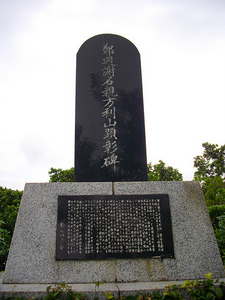Difference between revisions of "Jana Teido"
(still more to say) |
(image) |
||
| Line 1: | Line 1: | ||
| + | [[Image:Teido-stele.jpg|right|300px|thumb|A stele erected in honor of Tei Dô, in Tsushima Maru Memorial Park in [[Naha]], [[Okinawa]].]] | ||
*''Born: [[1549]]'' | *''Born: [[1549]]'' | ||
*''Died: [[1611]]'' | *''Died: [[1611]]'' | ||
| Line 15: | Line 16: | ||
{{stub}} | {{stub}} | ||
| + | |||
| + | Though villainized in much of the traditional literature, in recent years, Tei Dô's reputation has been rehabilitated, and a monument in his honor erected near [[Naminoue Shrine]], near the port he helped defend. | ||
==References== | ==References== | ||
Revision as of 15:31, 13 February 2012
Tei Dô was a Ryukyuan scholar-bureaucrat who was among the chief advisors to King Shô Nei at the time of the invasion of the Ryûkyû Kingdom by samurai forces from Satsuma han. He was known both by the Chinese-style name Tei Dô[1], and by his Ryukyuan rank or title, ueekata of Jana[2].
Born into the Kumemura scholar-aristocrat community, at age 16, he left for China, where he stayed for six years, studying at the Imperial Academy (Guozijian). After his return, he led or otherwise joined tribute missions to China from time to time.[3]
He was appointed to the Sanshikan in 1606, becoming one of the three topmost royal advisors.[4]
During the invasion, alongside Tomigusuku Seizoku, he commanded a force of 3000 men in the defense of the harbor of Naha, successfully repulsing the Satsuma approach by ship.[5] The samurai, however, simply made landfall elsewhere, and marched overland to seize Shuri castle, the royal palace. When they heard of the attack on Shuri, Tei Dô and Tomigusuku began moving their troops from Naha in order to ward off the attack, but in the end they were too late.[6]
After the kingdom's defeat, the king and his advisors were taken to Kagoshima, where they were forced to sign a number of oaths, swearing their loyalty and fealty to Satsuma. Only Tei Dô refused to sign. According to most accounts, he was beheaded on the spot.
Though villainized in much of the traditional literature, in recent years, Tei Dô's reputation has been rehabilitated, and a monument in his honor erected near Naminoue Shrine, near the port he helped defend.
References
- Turnbull, Stephen. The Samurai Capture a King: Okinawa 1609. Oxford: Osprey Publishing, 2009.
- ↑ It was typical among members of the Ryukyuan aristocrat-administrator class, heavily steeped in classical Chinese learning and in administrative/political structures based on Chinese models, to take Chinese-style names.
- ↑ A manor or territory within what is today the village of Nakijin.
- ↑ Okinawa rekishi jinmei jiten 沖縄歴史人名事典. Naha: Okinawa Bunka-sha, 2002. p36.
- ↑ Turnbull. p56.
- ↑ Turnbull. p19.
- ↑ Turnbull. p44.
